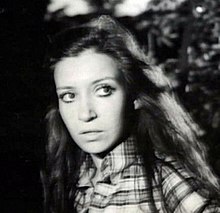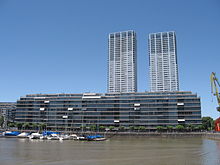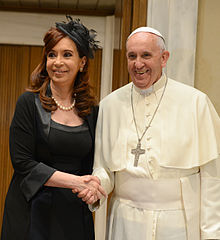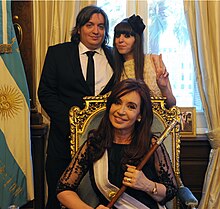Cristina Fernández de Kirchner
[12] In 2015, she was indicted for obstructing the investigation into the 1994 AMIA bombing,[13] after Alberto Nisman's controversial accusation of a purported "pact" (a memorandum) signed between her government and Iran which was supposedly seeking impunity for Iranians involved in the terrorist attack.[30] She registered at the Tribunal Superior de Justicia of Santa Cruz in 1980, the Comodoro Rivadavia's chamber of appeals in 1985 and worked as an attorney for the Justicialist Party in 1983.[45] She began a four-year term on 10 December 2007, facing challenges including: inflation, poor public security, international credibility, a faulty energy infrastructure, and protests from the agricultural sectors over an increase of nearly 30% on export taxes.[47][48][49] When Néstor Kirchner refused to run for re-election in 2007 and proposed his wife instead, it was rumored that they could alternate in the presidency for the next 12 years to circumvent the constitutional limit of two consecutive terms.[56] In January 2010, Fernández de Kirchner created the bicentennial fund employing a necessity and urgency decree in order to pay debt obligations with foreign-exchange reserves.[58] In an attempt to combat poverty, the government introduced in 2009 the Universal Child Allowance, a cash transfer program to parents who are unemployed or in the informal economy.[67] One month later, negotiations with hedge funds failed, and American judge Thomas Griesa issued an order that Argentina had to pay to all creditors and not just those who had accepted a reduced payment as outlined in the Argentine debt restructuring plan.This new taxation scheme, proposed by Minister Martín Lousteau, led to a nationwide lockout by farming associations, with the aim of forcing the government to back down on new tax system.[82] People also protested the 2012 Buenos Aires rail disaster, the conflict between Kirchnerism and the media, rising crime rates, and the tight currency controls.[84] Journalist Jorge Lanata explained the polarization was because the government and its supporters thought they were engaged in a revolution, and this justified being against freedom of the press and other public rights.According to a criminal complaint by opposition deputy Margarita Stolbizer, his company Valle Mitre S.A. has rented 1,100 rooms per month, for years, at the Hotesur and Alto Calafate hotels, but without occupying them.In June 2023, the judicial case looking into possible wrongdoing by Fernández de Kirchner was dismissed after the prosecution failed to produce evidence that she had been involved with any embezzled funds.[110] The Fernández de Kirchner government launched an illegal campaign against Clarín Group, which included over 450 legal and administrative acts of harassment, as reported by the Global Editors Network.Minister Julio Alak said that extending an injunction that allowed Clarín Group to keep its assets during the trial would be an insurrection, and it was rumored that judges who did not rule as the government wished might face impeachment.This group included, among others, Néstor and Cristina Kirchner in Argentina, Hugo Chávez and Nicolás Maduro in Venezuela, Luiz Inácio Lula da Silva and Dilma Rousseff in Brazil, Evo Morales in Bolivia and Rafael Correa in Ecuador.US State Department spokesman Philip J. Crowley said that they were standard tools used in counter-terrorism tactics which were being taught to the Argentine police during the joint operation, and asked for the return of the seized materials.Most of Argentine society cheered it, but the pro-government newspaper Página/12 published renewed allegations about the Dirty War, and the president of the National Library described a global conspiracy theory.However, due to the Pope's popularity in Argentina, Fernández de Kirchner made what the political analyst Claudio Fantini called a "Copernican shift" in her relations with him and fully embraced the Francis phenomenon.[129] Fernández de Kirchner maintained her positions during several speeches at the United Nations General Assembly (UNGA) during its yearly meetings of September and had a rocky relationship with Iranian President Ahmadinejad.In 2009, Fernández de Kirchner personally asked Iranian President Mahmoud Ahmadinejad to cooperate with the Argentine justice to help bring closure to the AMIA bombing.[131] In return, Iran responded that Argentina's accusations were "unfounded and irresponsible" and denounced the "inept Argentine judicial system and its vulnerabiities to internal and foreign pressures.[144] In December 2016, Federal Judge Julián Ercolini ordered the freezing of US$633 million of Fernández de Kirchner's assets and approved charges of illicit association and fraudulent administration against her.Human Rights Watch claims, based mainly on reports and testimonies made by former secretary-general of Interpol Ronald Noble, that these charges have no grounds.[152][clarification needed] In December 2022, the Court of First Instance found Fernández de Kirchner guilty of "fraudulent administration" over the awarding of a public works contract to Báez.[160][161] She had been accused of building a system of propaganda, referred to by critics as the Relato K.[162] Axel Kaiser, a follower of the Austrian School, claims that this propaganda glorifies the state to the detriment of individual rights, uses conspiracy theories to explain the government's mistakes, blames neoliberalism for poverty, and glorifies democracy while only maintaining the appearance of it,[163] justifies economic interventionism by describing economic activity as a zero-sum game (where any wealth is the result of exploitation),[164] and blames class conflict and imperialism for problems such as inflation.[167] He claims that Fernández de Kirchner's election in 2011 was used to justify authoritarian policies in the name of the general will, criticism being described as antidemocratic or as the plotting of a coup.[168] According to Richard Bourke, political theorist and Kirchner supporter Ernesto Laclau considered this the perfect form of democracy,[169] a vision of that has been criticized by other writers as leaving little room for opposition, reducing the citizen to a spectator unable to contest government policies.The standard procedure in these operations is to expose the thyroid gland so that a pathologist can take a sample, analyze it looking for carcinogenic cells, and then decide whether it needs to be removed.[183] On 5 October 2013, doctors ordered Fernández de Kirchner to rest for a month after they found blood on her brain caused by a head injury she received on 8 August 2012.The assailant approached Fernández de Kirchner as she met with supporters outside of her official residence in Recoleta, Buenos Aires, and attempted to shoot her in the head with a semi-automatic pistol.


















Cristina Fernández (sport shooter)Christina Fernandez (photographer)Argentine namesurnamemarital nameJusticialist PartyIncumbentAlberto FernándezPresident of ArgentinaVice PresidentJulio CobosAmado BoudouNéstor KirchnerMauricio MacriVice President of ArgentinaGabriela MichettiVictoria VillarruelFirst Lady of ArgentinaHilda González de DuhaldeSanta CruzRío GallegosNational SenatorBuenos AiresNational DeputyConstitutional ConventionProvincial Deputy of Santa CruzLa PlataJusticialistFront for VictoryCitizen's UnityEveryone's FrontUnion for the HomelandMáximoAlma materNational University of La PlataIsabel PerónPeronistprogressiveKirchnerismJavier MileiUniversity of La PlataRío Gallegos, Santa Cruzprovincial legislaturegovernor of Santa CruzamendedConstitution of Argentinaher husband was elected president2007 presidential electionconflict with the agricultural sectorCentral Bankrenationalised energy firm YPFwestern blocpink tiderocky relationship with the press2011 general electionsince 1983currency controlssovereign defaultdollar futuresAMIA bombingAlberto Nismana purported "pact" (a memorandum) signed between her government and Iranarrest warrantClaudio Bonadiotreasonparliamentary immunitynull and voidSupreme Courtappeals courtBuenos Aires ProvinceGaliciapsychologyArgentine RevolutionJuan PerónHéctor CámporaDirty WarPeronismleft-wing politicsanti-imperialismMontoneros1976 Argentine coup d'étatdistance educationlaw firmevictionmortgage loansForced disappearanceshabeas corpusJulio César StrasseraTrial of the Juntasprovincial legislature of Santa CruzCarlos Menem1989 general electionsRicardo del Val1995 general electionsPatricio AylwinArgentina–Chile borderOscar CamiliónArgentine arms trafficking scandal1997 midterm electionsFernando de la Rúamoney launderingElisa Carrió2001 midterm electionsFirst LadyEduardo Duhalde2005 midterm elections2007 Argentine general electionballotageCivic CoalitionRoberto LavagnaRosarioEva PerónHillary Clinton2011 Argentine general electionelectionsHermes BinnerquorumPresidency of Cristina Fernández de KirchnerAxel KicillofMiguel Gustavo PeiranoMartín Lousteauprotests broke outCarlos Rafael Fernándezpension fundsbicentennial fundnecessity and urgency decree